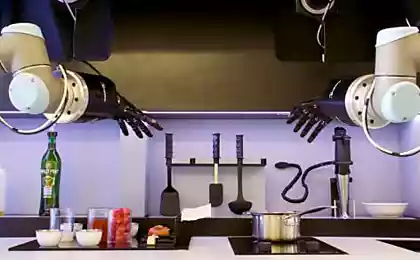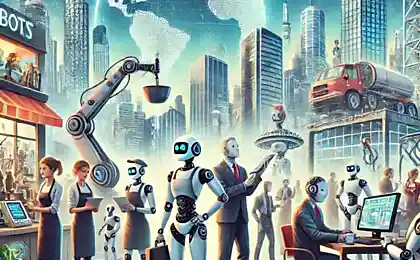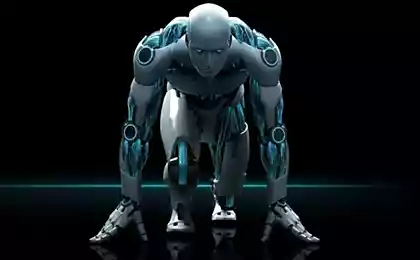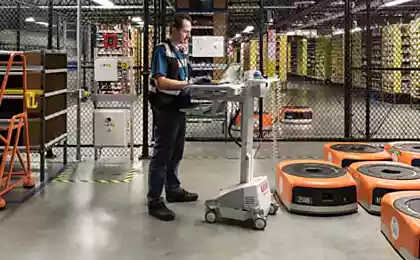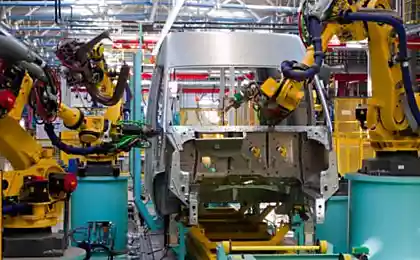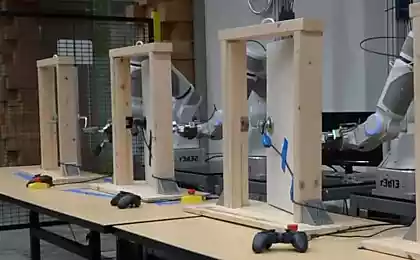1124
As automation increases the standard of living and saves jobs
45,665,542
Many analysts now predict future changes in the labor market - they believed in the coming years, millions of people could lose their jobs due to the introduction of new technologies and automation of many tasks.
Researchers James Sherk (James Sherk) and Lindsey Burke (Lindsey Burke) проанализировали Statistics and concluded that such fears were groundless - the automation of frequently changing the kind of work performed by people, but does not reduce the total demand in the economy work. As a result, only the standard of living rises.
Take a look at the theses of researchers and consider them in relation to the real business.
The demand for labor is endless h4> Many economists agree that the economy there is an almost limitless amount of work that can be done. The reason for this - in the growing needs of people. The average resident of many countries (the most striking example - the US and Europe) as a whole enjoys a standard of living at times higher than its compatriots in the early twentieth century. Nevertheless, none of the modern people will not give up additional purchases of goods and services if it receives additional money (bonus or increase).
The increase in life h4> Former workers of sphere of agriculture moved to the city and began to work in factories and offices. This food has become cheaper and available to buy goods became more . Technological advances have allowed using the same amount of labor to produce more. As a result of increased wages - the market encourages employers to pay employees in proportion to their productivity. Thus, the development of technology would decrease the overall employment only if people stopped to spend the extra income to buy new goods and services.
Technology even increase the demand for labor h4> The relationship of technical progress and the work is more complex than a simple transfer of routine computer tasks. Many professions involve the implementation of both routine and more complex intellectual tasks. Accordingly, automation of routine frees up more time on more complex work, and thus increases the productivity and labor.
Someone will still have to change occupation h4> The historical evidence suggests that people respond to technological change, finding a new job is often more lucrative than before the introduction of automation. But technology sometimes completely destroy certain professions, this trend will continue in the future - the developers of various products for the automation of trying to cover areas that previously were completely are beyond computers. Here is just a short list of professions, which suddenly came Automation:
Many analysts now predict future changes in the labor market - they believed in the coming years, millions of people could lose their jobs due to the introduction of new technologies and automation of many tasks.
Researchers James Sherk (James Sherk) and Lindsey Burke (Lindsey Burke) проанализировали Statistics and concluded that such fears were groundless - the automation of frequently changing the kind of work performed by people, but does not reduce the total demand in the economy work. As a result, only the standard of living rises.
Take a look at the theses of researchers and consider them in relation to the real business.
The demand for labor is endless h4> Many economists agree that the economy there is an almost limitless amount of work that can be done. The reason for this - in the growing needs of people. The average resident of many countries (the most striking example - the US and Europe) as a whole enjoys a standard of living at times higher than its compatriots in the early twentieth century. Nevertheless, none of the modern people will not give up additional purchases of goods and services if it receives additional money (bonus or increase).
Automation reduces the amount of work that is required for the production of certain goods and provision usug, but at the same time and reduced operating costs. Competition forces companies to use this advantage to reduce the price in the end the consumer wins, which for the same money, can afford more. And if people want to buy different goods and services in the relevant sectors of the economy increases the demand for workers.
The thesis of the great redistribution of labor is illustrated by the history of the United States. In 1910 about a third of Americans worked on farms, the food was expensive, and the average family spends nearly half of their income to buy food. By 1960, the development of technologies (eg, distribution of agricultural machinery such as tractors) have reduced the number of employees on the farms of the US population and about one tenth of the population. Nowadays, on the farm runs about 2% of Americans.
The increase in life h4> Former workers of sphere of agriculture moved to the city and began to work in factories and offices. This food has become cheaper and available to buy goods became more . Technological advances have allowed using the same amount of labor to produce more. As a result of increased wages - the market encourages employers to pay employees in proportion to their productivity. Thus, the development of technology would decrease the overall employment only if people stopped to spend the extra income to buy new goods and services.
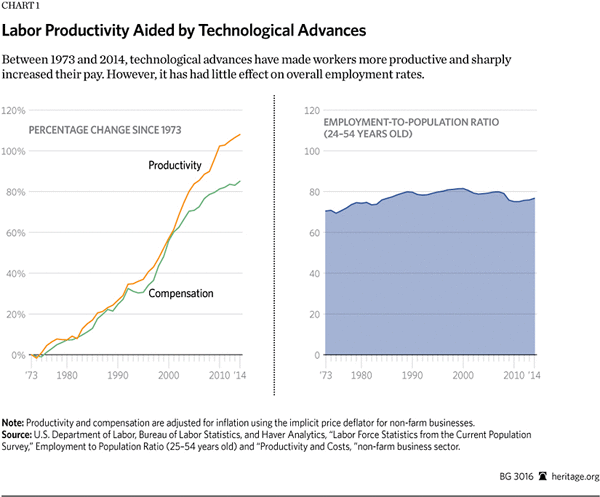
The chart above illustrates the average labor productivity in the United States between 1973 and 2014 year. During this period, technological innovations helped to increase productivity by 108%. The average hourly wage rate increased during this period by 85%. The distribution of employment by age has changed. Moreover, the economy found a job, and for the millions of women who entered the labor market in the 70s and 80s of the last century. Thus, technology and automation have increased salaries, but did not reduce overall employment.
Technology even increase the demand for labor h4> The relationship of technical progress and the work is more complex than a simple transfer of routine computer tasks. Many professions involve the implementation of both routine and more complex intellectual tasks. Accordingly, automation of routine frees up more time on more complex work, and thus increases the productivity and labor.
This thesis can be illustrated by examples from the restaurant business. Many institutions use the automation system (for example, Jowi ) and replace the tablet menu.
New technologies will enable people to carry out the order and pay for their food. In addition, increased sales - people are more likely will order the same dessert, cakes and cheesecakes if permanently displayed on the tablet.
The introduction of the possibility of instant payment сокращает common lunch for about five minutes. As a result, automated restaurants (soon to used gadgets can be added and smart hour s) can serve more people, even in the "hot clock". As a result, the demand for waiters, cooks, managers, who prepare delicious meals quickly and efficiently serve customers and well-controlled seated guests.
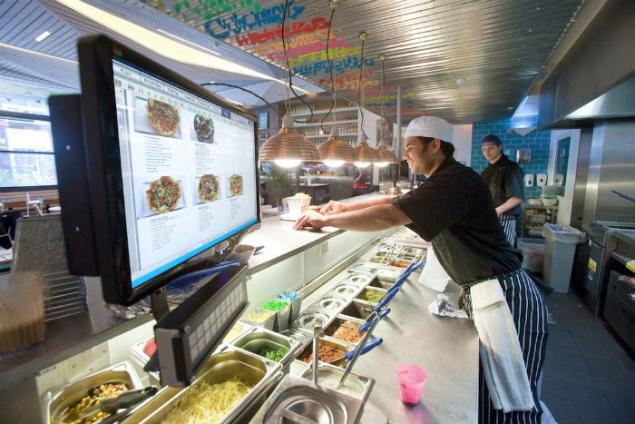
In addition, with the help of automation systems can be configured and the amount of tips that will be included in the bill - and thus, the waiters will get more (fewer people will go without leaving a tip).
Someone will still have to change occupation h4> The historical evidence suggests that people respond to technological change, finding a new job is often more lucrative than before the introduction of automation. But technology sometimes completely destroy certain professions, this trend will continue in the future - the developers of various products for the automation of trying to cover areas that previously were completely are beyond computers. Here is just a short list of professions, which suddenly came Automation:
- Cleaning of hotel rooms has always been considered exclusively human occupation, and the machine is considered only as a working tool (vacuum cleaners and washing machines). However, in the near future, one of Japanese hotels is planning полностью automate tasks using robots to work at the reception, luggage and room cleaning. This hotel is not expensive - a room will cost $ 60 per night.
- The engineers have managed to create a machine that can готовить 360 hamburgers per hour. It is estimated that such a system can save a fast food restaurant to $ 100 thousand. Per year.
- Computers already trust писать small news stories in the media - many infopovody highlights one pattern (the results of matches, yield economic statistics).
- IBM Watson supercomputer is able находить correlation studies that scientists themselves could miss. However, to do research on their own machine can not be soon.
Source: geektimes.ru/company/jowi/blog/259190/
New Horizons has sent high-quality photos of small satellites of Pluto: Nobody Hydra
Astronomers using the radio telescope ALMA spotted early galaxies with unprecedented clarity


